The Best US to Fiji Power Adapter [Reviews 2025]
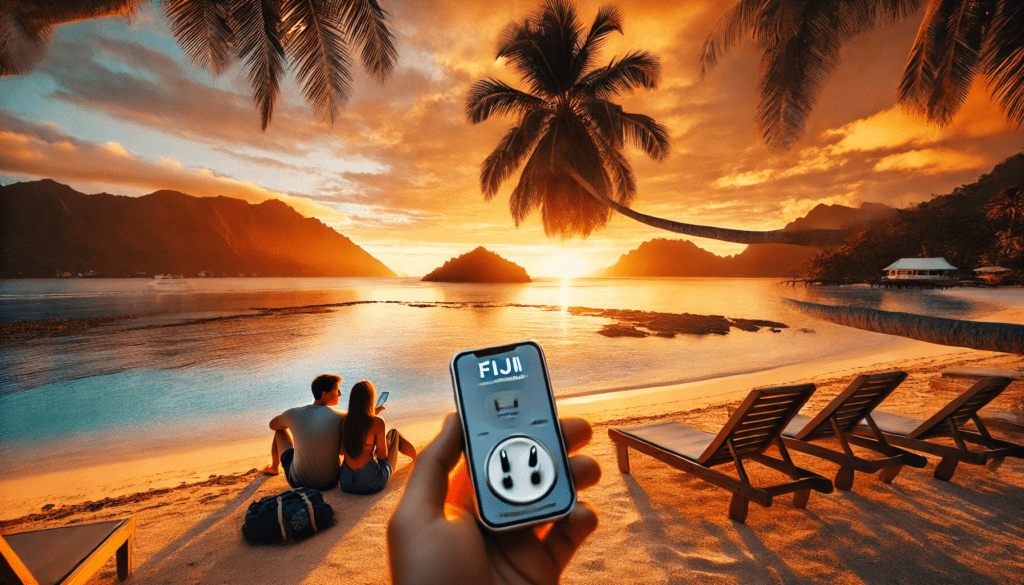
Packing for Fiji? Don’t forget the right US to Fiji power adapter!
I learned the hard way when my camera battery died at the Coral Coast.
This guide will ensure you’re ready to power your devices with ease, so you can enjoy Fiji’s beaches and stunning sunsets worry-free.
Plug Types and Voltage in Fiji
Fiji uses type I plugs, featuring three flat pins in a triangular pattern. The standard voltage is 240V with a frequency of 50Hz, different from the US standard of 120V.
This means you’ll need a Fiji plug adapter to fit local outlets. Additionally, single-voltage devices (like older hair dryers) may require a voltage converter.
Modern devices such as laptops and smartphones often support dual voltage, so a plug adapter is typically sufficient. Always check your device’s label for “100-240V” compatibility.
Oceanic Countries: Same Plug & Voltage
If you’re heading to Fiji, you’ll be glad to know that their Type I plugs and 240V/50Hz system are pretty common in the region.
Countries like Australia, New Zealand, Papua New Guinea, the Solomon Islands, Tonga, Vanuatu, Kiribati, Tuvalu, and the Cook Islands all use the same setup.
So, if you’ve got a good adapter for Fiji, it’ll work in these places too—super handy for island-hopping adventures!”
Top 3 Plug Adapters for Fiji
| TESSAN Power Adaptor | HANYCONY Power Plug Adapter | Kakahigh Power Plug Adapter |
|---|---|---|
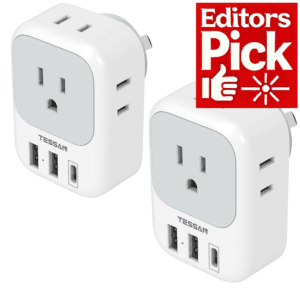 | 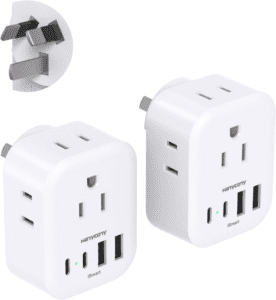 | 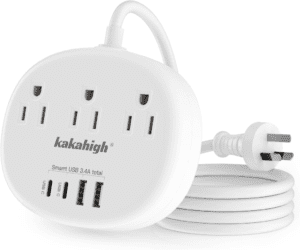 |
| Compatible With: Australia, New Zealand, China, Fiji, more | Compatible With: Australia, New Zealand, China, Fiji, more | Compatible With: Australia, New Zealand, China, Fiji, more |
| Plug Types: Type I | Plug Types: Type I | Plug Types: Type I |
| Key Features: 7-in-1 with USB-C, compact | Key Features: 8-in-1 with USB-C, compact | Key Features: 7-in-1 with extension cord, safety-certified |
| Best For: Multi-device travelers | Best For: Fast USB charging | Best For: Safety and versatility |
| Read More & Buy | Read More & Buy | Read More & Buy |
3. Kakahigh Power Plug Adapter
Fijian Plug Adapter Reviews
1: TESSAN Power Plug Adapter
- Brand: Tessan
- Item Weight: 8.1 ounces
- Input Voltage: 250V
- Dimensions: 3.1 x 2.2 x 2.4 inches
- Key Features: 7-in-1 design with 4 American outlets, 3 USB ports (including 1 USB-C). Compact, lightweight, no surge protection.
Key Features:
This 7-in-1 plug adapter features 4 American outlets and 3 USB ports, including 1 USB-C. It’s lightweight and compact, making it easy to pack. Ideal for dual-voltage devices, it works seamlessly in Fiji and other Type I countries.
Pros:
- Allows simultaneous charging of up to 7 devices.
- USB-C port provides fast charging for modern devices.
- Compact and travel-friendly design.
Cons:
- Does not support voltage conversion.
- No surge protection, unsuitable for high-power appliances.
Best For:
Perfect for families or solo travelers carrying multiple devices like smartphones, laptops, and cameras.
2: HANYCONY Plug Adapter
- Brand: Hanycony
- Item Weight: 2.4 ounces
- Input Voltage: 250V
- Dimensions: 2.2 x 1.7 x 2.8 inches
- Key Features: 8-in-1 design with 4 American outlets, 3 USB ports (2 USB-C), lightweight, compact, and faster USB charging.
Key Features:
This 8-in-1 adapter includes 4 American outlets and 3 USB ports (2 USB-C), offering faster charging. Compact and lightweight, it’s great for efficient packing.
Pros:
- Charges up to 8 devices simultaneously.
- USB-C ports provide 30% faster charging.
- Affordable and lightweight for travel.
Cons:
- No surge protection or voltage conversion.
- Limited to Type I outlets.
Best For:
Ideal for tech-savvy travelers who rely on fast-charging devices like phones and tablets.
3: Kakahigh Power Adapter
- Brand: Kakahigh
- Item Weight: 10.4 ounces
- Input Voltage: 250V
- Dimensions: 4.3 x 3.3 x 0.1 inches
- Key Features: 7-in-1 design, 4.2 ft extension cord, 2 USB-C ports, ETL-certified safety, compact, and lightweight.
Key Features:
This 7-in-1 adapter includes 4 American outlets, 2 USB-C ports, and a 4.2-ft extension cord. Its ETL certification ensures safety, making it a reliable choice for travelers.
Pros:
- Includes a long extension cord for flexibility.
- USB-C ports support faster charging.
- Safety-certified with a grounded design.
Cons:
- Heavier than other options due to the extension cord.
- Does not convert voltage.
Best For:
Travelers who prioritize safety and need flexibility with an extension cord.
Do You Need a Voltage Converter?
Voltage converters are essential for single-voltage devices in Fiji’s 240V system. Many US devices, like older hair dryers or electric razors, operate at 120V and can’t handle higher voltages. Using these devices without a converter can result in damage or hazards.
However, most modern electronics (laptops, smartphones, cameras) are dual-voltage, meaning they’re compatible with both 120V and 240V. To check, look for a label reading “Input: 100–240V” on your device. If your device is dual-voltage, a Fiji plug adapter is all you need.
For single-voltage devices, invest in a reliable voltage converter, like the FOVAL or Ceptics models, which safely step down Fiji’s 240V to 110V.
Top 3 Fijian Voltage Converters
| FOVAL Voltage Converter | Ceptics Voltage Converter | Key Power Voltage Converter |
|---|---|---|
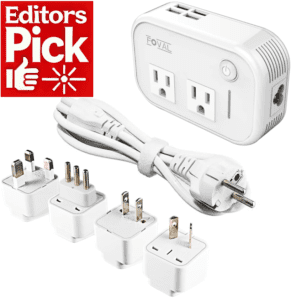 | 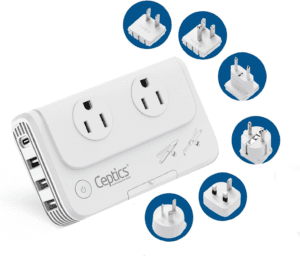 | 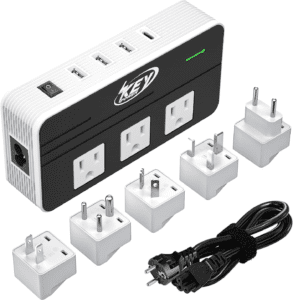 |
| Compatibility: Over 160 countries | Compatibility: Over 150 countries | Compatibility: Over 150 countries |
| Plug Types: US/UK/EU/AU | Plug Types: US/UK/EU/AU | Plug Types: US/UK/EU/AU |
| Key Features: Step-down to 110V, multiple USB ports | Key Features: Converts 220V to 110V, USB charging | Key Features: Converts 240V to 110V, safety-certified |
| Best For: Lightweight travelers | Best For: Tech-savvy travelers | Best For: High-power needs |
| Read More & Buy | Read More & Buy | Read More & Buy |
2. Ceptics Travel Voltage Converter
3. Key Power Voltage Converter
Fijian Voltage Converter Reviews
1: FOVAL Voltage Converter
Brand: FOVAL
Item Weight: 0.5 kg
Input Voltage: 240V
Dimensions: 4.82 x 3.13 x 1.47 inches
Key Features: Converts 240V to 110V, 4 USB ports, silent fan, surge protection
The FOVAL Voltage Converter is perfect for stepping down 240V power to 110V while simultaneously charging multiple devices. Compact, lightweight, and equipped with a silent fan, it’s ideal for quiet operation. Its surge protection ensures your devices are safe during use.
- Pros: Lightweight, silent operation, built-in surge protection.
- Cons: Limited to devices under 230W, not suitable for dual-voltage electronics.
- Best For: Lightweight travelers with single-voltage devices like razors or toothbrushes.
2: Ceptics Voltage Converter
Brand: Ceptics
Item Weight: 15 ounces
Input Voltage: 220–240V
Dimensions: 4.8 x 3.1 x 1 inches
Key Features: Converts 240V to 110V, 4 USB ports (PD 18W), safety-certified with auto shutoff
The Ceptics Voltage Converter offers reliable voltage conversion and fast USB charging. Designed to handle high-powered devices up to 200W, it’s perfect for curling irons or personal care appliances. Its safety features, including auto-shutoff, add extra peace of mind.
- Pros: Fast USB charging, compact design, supports high-power devices.
- Cons: Slightly bulkier, USB ports unsuitable for high-wattage laptops.
- Best For: Travelers needing fast USB charging and safety features for personal appliances.
3: Key Power Voltage Converter
Brand: Key Power
Item Weight: 11.2 ounces
Input Voltage: 220–240V
Dimensions: 6.35 x 3.2 x 1.58 inches
Key Features: Converts 240V to 110V, 4 USB ports (PD 18W), ETL-certified safety
The Key Power Voltage Converter is a versatile option for travelers carrying a mix of high-power and USB devices. It’s certified for safety, with protections against overcurrent and overheating. Its multiple USB ports make it perfect for simultaneous device charging.
- Pros: Reliable for high-power devices, ETL-certified, multiple USB ports.
- Cons: Heavier and bulkier, limited to devices under 230W.
- Best For: Travelers with high-power devices and USB charging needs.
Buying Guide
When traveling to Fiji, choosing the right US to Fiji power adapter or voltage converter is essential to keep your devices running smoothly.
First, determine if your devices are dual-voltage. Look for labels that say “100–240V.” If they are, you only need a plug adapter. For single-voltage devices, like some older hair dryers or curling irons, you’ll need a voltage converter to step down Fiji’s 240V system to 120V.
Consider features such as USB ports for multi-device charging and compact designs to save luggage space. Adapters like the HANYCONY adapter offer fast charging for tech-heavy travelers, while the Kakahigh adapter adds flexibility with an extension cord. If safety is a priority, look for models with certifications like ETL, ensuring reliability.
Avoid adapters with unnecessary features for your trip, like surge protection if you’re not visiting areas prone to electrical surges. Focus on durability, lightweight designs, and compatibility with your devices to make your Fiji adventure hassle-free.
FAQs
Q: What type of plug does Fiji use?
A: Fiji uses type I plugs, with three flat pins in a triangular pattern. US travelers will need a Fiji plug adapter to connect their devices to local outlets.
Q: Will my US phone charger work in Fiji?
A: Most US phone chargers are dual-voltage, meaning they can handle Fiji’s 240V. You’ll need a Fiji adapter to fit the plug type, but no voltage converter is required.
Q: Can I use my hair dryer in Fiji?
A: Only if your hair dryer is dual-voltage. Single-voltage dryers will require a voltage converter to operate safely in Fiji.
Q: Do I need a surge protector for Fiji?
A: Not necessarily. Fiji’s power grid is generally stable, but if you’re visiting remote areas, a surge protector might provide extra peace of mind.
Q: How many adapters should I bring to Fiji?
A: This depends on how many devices you’ll use simultaneously. For multiple devices, consider an adapter with multiple outlets and USB ports.
Q: Can I use US plugs directly in Fiji?
A: No, US plugs won’t fit Fiji’s outlets. You’ll need a Fiji power adapter to connect your devices.
Q: Are voltage converters safe for laptops?
A: Most laptops are dual-voltage and don’t need a converter—just a plug adapter. For single-voltage laptops, ensure the converter matches your device’s wattage.
Grab the Best US to Fiji Power Adapter
Don’t let incompatible plugs disrupt your Fijian adventure! Grab the best US to Fiji power adapter or voltage converter today.
Explore the options above and ensure your devices stay powered while you enjoy Fiji’s stunning beaches and vibrant culture. Click to shop now!
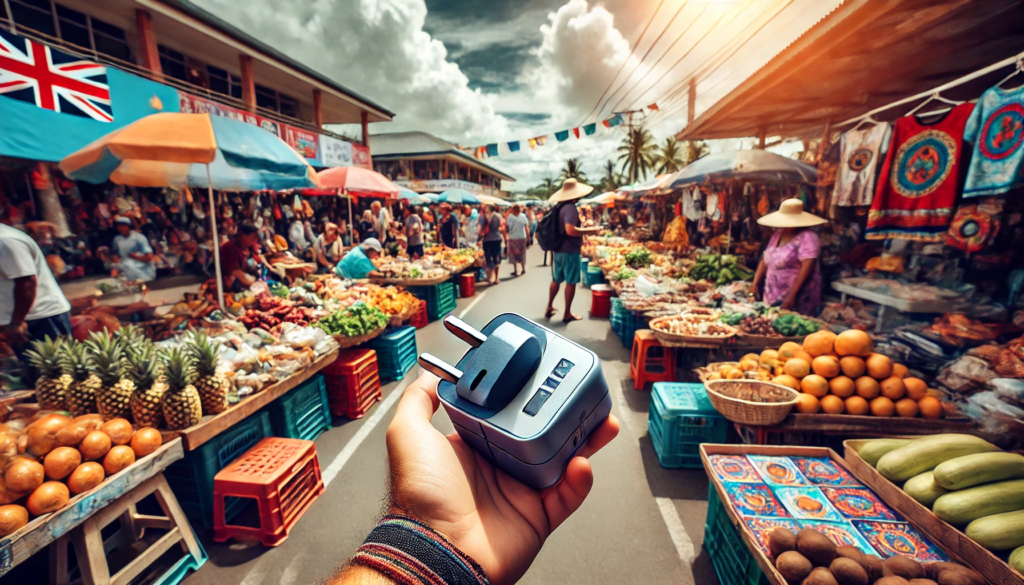
Travel Guide & Power Essentials for Fiji
Fiji, with its sun-kissed beaches, vibrant coral reefs, and welcoming culture, is a dream destination for travelers.
Whether you’re snapping photos of the Mamanuca Islands or exploring Suva’s lively markets, staying powered up is essential.
On my first trip to Fiji, I forgot a US to Fiji power adapter, leaving my phone dead during a stunning Coral Coast sunset!
That experience taught me the importance of being prepared with the right travel gear.
Fiji uses unique outlet types and voltage standards that differ from the US, so having the correct Fiji plug adapter is crucial.
In this guide, I’ll share everything you need to know about adapters, converters, and packing essentials to make your trip seamless.
Why Adapters Matter in Fiji
Adapters are a must-have when visiting Fiji, as the country operates on type I outlets, featuring three flat pins in a triangular arrangement. The voltage standard is 240V, which is higher than the US’s 120V. Plugging in your devices without the right adapter can leave you frustrated—or worse, damage your electronics.
I learned this lesson the hard way when my US charger didn’t fit the Fiji outlets during a remote island stay. Thankfully, a kind hotel receptionist lent me a spare plug adapter for Fiji, saving my trip.
To avoid mishaps, always pack a Fiji plug adaptor or a universal travel adapter with surge protection. For single-voltage devices like older hair dryers, a power adapter for Fiji alone won’t be enough—you’ll need a voltage converter.
Being prepared ensures you can capture every magical moment without worrying about dead batteries or device compatibility.
Top Attractions and Local Experiences
Fiji offers an array of breathtaking attractions, and staying powered up ensures you won’t miss a moment.
Start your journey at the Garden of the Sleeping Giant, just outside Nadi. This serene orchid garden is a photographer’s paradise, and having a fully charged camera is essential.
Next, explore the Sigatoka Sand Dunes, a UNESCO World Heritage site. A portable power bank is a lifesaver here since outlets may be scarce in remote areas.
For water lovers, the Mamanuca and Yasawa Islands boast turquoise waters and vibrant marine life.
Whether you’re capturing underwater shots while snorkeling or using GPS to navigate your island hopping, a reliable Fiji adapter plug type is indispensable.
Don’t miss Sri Siva Subramaniya Temple in Nadi, a cultural gem showcasing vibrant Hindu architecture. Your phone will come in handy for photos and translation apps.
From the bustling streets of Suva to the peaceful village of Navala, having a charged device ensures you can connect, navigate, and document your Fijian adventure effortlessly.
Choosing the Right Plug Adapter and Converter
Choosing the correct plug adapter for Fiji starts with understanding the local power setup. Fiji uses type I outlets, and the voltage is 240V. A US to Fiji power adapter is essential for fitting your devices into these outlets.
If your device supports dual voltage (100–240V), a plug adapter is all you’ll need. Most modern electronics, like laptops and smartphones, are dual-voltage. Check your device’s label to confirm.
For single-voltage devices, like some hair dryers, you’ll need a voltage converter to safely step down Fiji’s power. Look for converters with built-in USB ports to save space.
Personally, I recommend adapters with multiple USB ports, such as the HANYCONY 8-in-1 adapter, which offers fast charging for multiple devices. Avoid bulky models with unnecessary features, and ensure your adapter is lightweight and travel-friendly.

Packing Tips for Fiji
Packing for Fiji means balancing tropical essentials with practical gear. Aside from your Fiji plug adapter, here’s a quick checklist:
- Portable Power Bank: Ideal for long sightseeing days.
- Universal Travel Adapter: Works if you plan to visit other Pacific countries.
- Sunscreen and Bug Spray: Must-haves for outdoor adventures.
- Lightweight Rain Jacket: Fiji’s tropical weather can be unpredictable.
- Dry Bag: Perfect for keeping electronics safe during beach or water activities.
During my trip to Fiji, I found my compact travel adapter invaluable when hopping between resorts and rural areas. Pack wisely, and your adventure will be worry-free.
Stories from Local Adventures
One of my favorite Fijian memories was snorkeling at Beqa Lagoon, known for its colorful coral reefs.
Midway through, my GoPro battery died, and I realized I’d forgotten to charge it. Thankfully, I had my trusty Fiji plug adapter back at the resort, allowing me to recharge quickly and return for an afternoon dive.
Having the right travel gear can make or break your experience, especially in a destination as picturesque as Fiji. Always double-check your packing list to avoid missing out on moments like these.
Practical Travel Tips
Navigating Fiji is a breeze with these practical tips:
- Transportation: Buses and taxis are common, but outlets may not be available. Carry a portable power bank.
- Accommodation: Most hotels offer outlets compatible with a Fiji plug adaptor, but budget accommodations may not. Bring your own adapter for peace of mind.
- Dining and Charging: Many cafes and restaurants have charging stations. Always carry your adapter to ensure compatibility.
- Remote Areas: For off-grid adventures, consider a portable solar charger or a high-capacity power bank.
- Airports and Stations: Charging kiosks are available but often crowded. A multi-port adapter lets you share outlets with other travelers.
These tips will keep you powered and connected throughout your Fijian journey.
Final Tips
Preparation is key for an unforgettable trip to Fiji. Pack a reliable power adapter for Fiji, confirm your devices are dual-voltage, and bring portable charging options for remote adventures.
Stay powered, explore Fiji’s stunning landscapes, and immerse yourself in its rich culture without worrying about dead batteries or incompatible outlets.
Ready to start your adventure? What are your must-have travel items for Fiji? Share your tips in the comments!
FAQs:
Q: What adapter do I need for Fiji?
A: You’ll need a Fiji plug adapter compatible with type I outlets.
Q: Do I need a power adapter for Fiji?
A: Yes, US devices require a US to Fiji power adapter to fit local outlets.
Q: What voltage does Fiji use?
A: Fiji uses 240V with a frequency of 50Hz.
Q: Can I charge my phone in Fiji?
A: Yes, most modern phones are dual-voltage. Bring a Fiji plug adapter to connect to type I outlets.
Q: Are power banks allowed on flights to Fiji?
A: Yes, power banks under 100Wh are allowed in carry-on luggage.
Plug Adapter Rating - TESSAN Power Adaptor
Multiple Power Outlets
USB & USB C Outlets
Compatible for Oceanic
Plug Adapter Rating
TESSAN Power Adaptor








![What to do Miami This Weekend [date]](https://tripsandtours.com/wp-content/uploads/2021/12/What-to-do-Miami-This-Weekend-date-390x220.jpg)
![Miami Big Bus Tours - Hop on Hop Off in Miami [year]](https://tripsandtours.com/wp-content/uploads/2023/04/Big-Bus-Miami-390x220.jpg)
